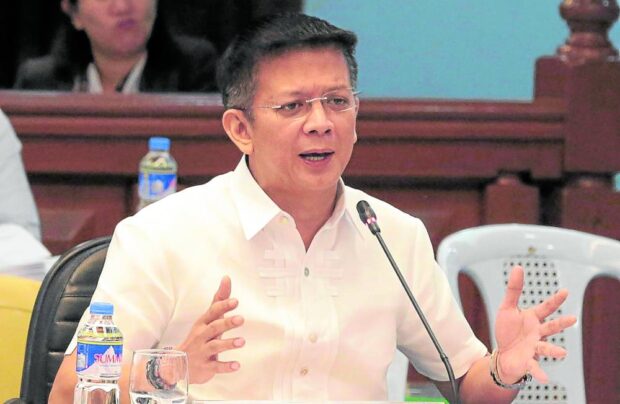
Sen. Francis Escudero (INQUIRER FILE PHOTO)
MANILA, Philippines — Deducting pension premiums from the monthly pay of active members of the military and other uniformed personnel (MUP) may be a “bitter pill to swallow,” but it is necessary to stop state coffers from bleeding dry, Sen. Francis Escudero said on Sunday.
Escudero, who previously headed the Senate finance committee, argued that imposing the mandatory contribution to the proposed new retirement system only on incoming members of the uniformed services would not be enough to plug the financial drain of their pension system.
He noted that, at present, the attrition rate among those in the law enforcement and security sectors was about 3 percent annually.
“If it is only imposed on new entrants, it will take us 33 years to correct this unsustainable predicament, which has taken too much toll on the government’s fiscal position,” Escudero told the Inquirer.
“It is admittedly a bitter pill to swallow. That is why we should be thorough in examining all possibilities and make it least painful for both the MUP and the national government,” the lawmaker said.
Unlike the Social Security System and the Government Service Insurance System (GSIS) which are partly financed by members’ contributions, the MUP pension is fully funded by the national government.
Escudero said revisions in the pension plan of MUP should have been done when then President Rodrigo Duterte almost doubled their monthly salaries in 2018.
“That would have been the best time to impose these mandatory contributions,” he said.
The proposal of President Marcos’ economic team to make all MUPs contribute to their fund is aimed at addressing the government’s mounting unfunded obligations which have reached P9.6 trillion in 2020.
Actuarial study
The Department of Finance (DOF), however, should be able to answer critical questions regarding its plan, such as the possibility of MUPs in active service retiring early to maximize their pension benefits, Escudero noted.
“I am more than willing to study the details of this proposal because I agree with [the President] that this problem of the MUP pension should be addressed at the soonest,” the senator said.
He said among the questions the DOF must be able to answer was the actual amount that each MUP would be paying.
Escudero also wanted to know the source of the government’s mandatory share of 12 percent in the pension fund and its actual figure annually.
Mr. Marcos’ economic team has proposed that MUPs in active service contribute 5 percent of their monthly pay for the first three years of the new plan.
New entrants to the uniformed services would contribute 9 percent of their basic salary and longevity pay, according to a statement on Saturday by a technical working group (TWG) led by the DOF, created to help craft a pension reform law for MUPs.
The TWG said the government would supplement the MUP contributions so that the monthly premium would total 21 percent—16 percent to those in the active service and 12 percent to the new entrants. The total monthly premium is the same for other state employees.
“Will it apply to all or only to certain MUPs depending on when they will retire or how many more years before they retire? And did they factor in the possibility of early retirement?” Escudero asked.
“Have they done a thorough actuarial study regarding this and other possible formulas?” he added.
In particular, the senator said the DOF should be able to explain if the proposed pension system would be “sustainable” in 25, 50 or 100 years.
“The reason why I want to see a full, complete and thorough actuarial study is to see all options,” he said, “[such as] starting with 2 to 3 percent on the first to third or fourth year, and work our way up to 9 percent in 9 or 13.5 years to 12 or 18 years.”
In addition, Escudero said he wanted to know if the planned changes would be similar with the pension system of the GSIS, which only covers state workers who rendered at least 15 years in service.

